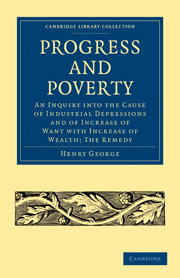 Progress and Poverty
Progress and Poverty Published online by Cambridge University Press: 07 September 2011
The preceding examination has, I think, conclusively shown that the explanation currently given, in the name of political economy, of the problem we are attempting to solve, is no explanation at all.
That with material progress wages fail to increase, but rather tend to decrease, cannot be explained by the theory that the increase of laborers constantly tends to divide into smaller portions the capital sum from which wages are paid. For, as we have seen, wages do not come from capital, but are the direct produce of labor. Each productive laborer, as he works, creates his wages, and with every additional laborer there is an addition to the true wages fund—an addition to the common stock of wealth, which, generally speaking, is considerably greater than the amount he draws in wages.
Nor, yet, can it be explained by the theory that nature yields less to the increasing drafts which an increasing population make upon her; for the increased efficiency of labor makes the progressive state a state of continually increasing production per capita, and the countries of densest population, other things being equal, are always the countries of greatest wealth.
So far, we have only increased the perplexities of the problem. We have overthrown a theory which did, in some sort of fashion, explain existing facts; but in doing so have only made existing facts seem more inexplicable.
To save this book to your Kindle, first ensure [email protected] is added to your Approved Personal Document E-mail List under your Personal Document Settings on the Manage Your Content and Devices page of your Amazon account. Then enter the ‘name’ part of your Kindle email address below. Find out more about saving to your Kindle.
Note you can select to save to either the @free.kindle.com or @kindle.com variations. ‘@free.kindle.com’ emails are free but can only be saved to your device when it is connected to wi-fi. ‘@kindle.com’ emails can be delivered even when you are not connected to wi-fi, but note that service fees apply.
Find out more about the Kindle Personal Document Service.
To save content items to your account, please confirm that you agree to abide by our usage policies. If this is the first time you use this feature, you will be asked to authorise Cambridge Core to connect with your account. Find out more about saving content to Dropbox.
To save content items to your account, please confirm that you agree to abide by our usage policies. If this is the first time you use this feature, you will be asked to authorise Cambridge Core to connect with your account. Find out more about saving content to Google Drive.